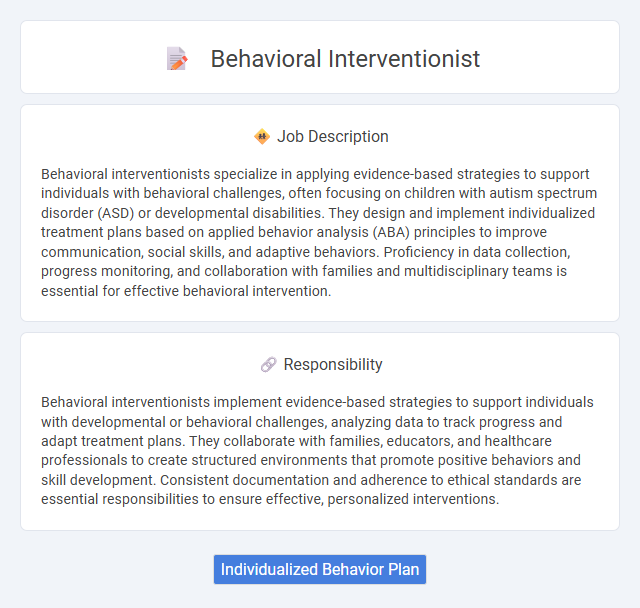
Behavioral interventionists specialize in applying evidence-based strategies to support individuals with behavioral challenges, often focusing on children with autism spectrum disorder (ASD) or developmental disabilities. They design and implement individualized treatment plans based on applied behavior analysis (ABA) principles to improve communication, social skills, and adaptive behaviors. Proficiency in data collection, progress monitoring, and collaboration with families and multidisciplinary teams is essential for effective behavioral intervention.
Individuals with strong empathy and patience will likely be suitable for a behavioral interventionist job, as it involves working closely with people facing developmental or behavioral challenges such as autism or ADHD. People who can maintain consistency and adapt strategies based on individual responses may have a higher probability of success in this role. Those who struggle with managing stress or require a strictly routine work environment might find this job less compatible.
Qualification
Behavioral interventionists typically require a minimum of a bachelor's degree in psychology, special education, or a related field, with many employers preferring candidates holding a Master's degree. Certification such as Registered Behavior Technician (RBT) or Board Certified Assistant Behavior Analyst (BCaBA) enhances employment prospects and validates expertise in Applied Behavior Analysis (ABA) techniques. Strong skills in data collection, behavior assessment, and individualized intervention planning are essential qualifications for success in this role.
Responsibility
Behavioral interventionists implement evidence-based strategies to support individuals with developmental or behavioral challenges, analyzing data to track progress and adapt treatment plans. They collaborate with families, educators, and healthcare professionals to create structured environments that promote positive behaviors and skill development. Consistent documentation and adherence to ethical standards are essential responsibilities to ensure effective, personalized interventions.
Benefit
Behavioral interventionist roles likely offer significant benefits by providing opportunities to make a direct impact on individuals' developmental progress and emotional well-being. Professionals in this field probably experience job satisfaction from helping clients achieve measurable behavioral improvements through tailored interventions. The position may also provide steady demand and career growth prospects due to increasing awareness of behavioral therapies and support needs.
Challenge
Behavioral interventionists likely face the challenge of adapting techniques to meet diverse client needs effectively. Managing unpredictable behaviors and maintaining patience during difficult sessions may frequently test their problem-solving skills. Success often depends on their ability to implement individualized strategies while navigating emotional and environmental complexities.
Career Advancement
Behavioral interventionists gain valuable experience working directly with individuals affected by behavioral challenges, leading to opportunities in clinical supervision and specialized therapy roles. Advanced certifications such as Board Certified Behavior Analyst (BCBA) significantly enhance career prospects and salary potential. Pursuing higher education in psychology or applied behavior analysis facilitates transitions into leadership and research positions within healthcare organizations.
Key Terms
Individualized Behavior Plan
A Behavioral Interventionist specializes in developing and implementing Individualized Behavior Plans (IBPs) aimed at addressing specific behavioral challenges in children and adults with developmental disorders such as autism spectrum disorder (ASD). The IBP incorporates data-driven strategies tailored to the individual's needs, focusing on positive reinforcement, skill acquisition, and behavior modification. Effective IBPs require continuous monitoring and collaboration with multidisciplinary teams including psychologists, educators, and families to ensure measurable progress and improved quality of life.
 kuljobs.com
kuljobs.com